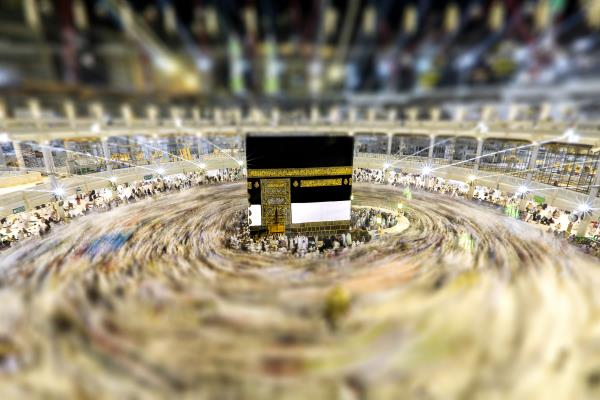Indeed from the greatest benefits and lessons from Hajj for the pilgrims to the House of Allah is knowing the importance of the Sunnah and limiting oneself to it in all actions of the Hajj. The importance of knowing the Sunnah becomes apparent from the state of many pilgrims who you see gathering together in circles of knowledge and remembrance. They ask the scholars many questions regarding the description of Hajj: how to perform it, its pillars and obligatory duties and those acts that negate it. These questions are asked with precision and enthusiasm, especially by those who, in their Hajj, are conscious of the saying of the Messenger of Allah – sallAllaahu alayhi wa sallam-: ‘Take your Hajj rites from me’
Therefore Hajj will not be accepted by Allah unless the Muslim does it in the manner of the Messenger of Allah, adhering to his guidance in the Hajj and following his Sunnah – without excess or negligence, without going to extremes or being without purpose and  without adding to or taking away from it. So if a Muslim adheres to the Sunnah of the Prophet – sallAllaahu alayhi wa sallam- in his Hajj and limits himself to his guidance, he benefits from the knowledge that adhering to the Sunnah and following his – sall’Allaahu alayhi wasallam- guidance is obligatory in all acts of obedience.
without adding to or taking away from it. So if a Muslim adheres to the Sunnah of the Prophet – sallAllaahu alayhi wa sallam- in his Hajj and limits himself to his guidance, he benefits from the knowledge that adhering to the Sunnah and following his – sall’Allaahu alayhi wasallam- guidance is obligatory in all acts of obedience.
Just as it is necessary to take the rites of Hajj from the Messenger, it is also necessary for all Muslims to take the guidance of the Messenger in every act of obedience.
This is why the Messenger of Allah – sallAllaahu alayhi wa sallam- said with regards to prayer: ‘pray as you have seen me praying.’
He also said in all matters of general obedience: ‘Whoever does an action which we have not commanded then it is rejected.’
In another narration: ‘Whoever innovates in this matter of ours, that which is not from it, it will be rejected.’
Thus all actions which are not done in accordance to the guidance of the Messenger of Allah – sallAllaahu alayhi wa sallam- will not be accepted by Allah, as is shown by his explicit statement – sallAllaahu alayhi wa sallam: ‘Whoever does an action which we have not commanded then it is rejected.’
 Indeed this proves that every innovation (Bida’) introduced into the religion has no foundation in the Book or Sunnah, regardless of whether it is from knowledge-based verbal innovations or practical, worship-based innovations. So whoever informs of other than that which Allah and His Messenger – sallAllaahu alayhi wa sallam- have informed or worships in a way that Allah and His Messenger have not permitted then this will be returned to the one who did it and it will not be accepted.
Indeed this proves that every innovation (Bida’) introduced into the religion has no foundation in the Book or Sunnah, regardless of whether it is from knowledge-based verbal innovations or practical, worship-based innovations. So whoever informs of other than that which Allah and His Messenger – sallAllaahu alayhi wa sallam- have informed or worships in a way that Allah and His Messenger have not permitted then this will be returned to the one who did it and it will not be accepted.
This hadeeth also implies the meaning that anyone who does an action in accordance to what Allah and His Messenger have commanded i.e. is worshipping Allaah with correct creed and righteous actions from what is obligatory and recommended, then his action will be accepted.
It is narrated by Abu Daawood, Tirmidhi, Ibn Majah and others on the authority of al-Irbaad bin Sariyyah – RadhiAllaahu anhu- who said that the Messenger of Allah – sallAllaahu alayhi wa sallam- led us in prayer that day, then turned and faced us and gave us an admonition which caused hearts to tremble and eyes to shed tears.
So we said: ‘It is as if this is a farewell speech, so advise us O Messenger of Allah!’
He said: ‘I advise you to hear and obey, even if a slave rules over you. Indeed whosoever from you lives will see many differences, so hold on to my Sunnah and the Sunnah of the Rightly Guided Khulafaah after me, bite on to it with your molar teeth. Beware of newly invented matters, since every Bida’ is misguidance.’
As for the Messenger of Allah – sallAllaahu alayhi wa sallam- saying in the hadeeth ‘All Bida’ is misguidance’ then this is from his comprehensive, eloquent speech. This statement is a great principle from the principles of the Deen and it resembles the saying of the Messenger of Allah – sallAllaahu alayhi wa sallam: ‘Whoever innovates anything in this matter of ours that which is not from it, will be rejected.’
Thus anyone who innovates and ascribes something to the Deen which has no foundation to which it can be referred, then it is misguidance which the Deen is free from, the one who innovates has the innovation rejected and it is not accepted from him.
The Deen of Allah is built upon two great, strong principles and foundations. Firstly; That we do not worship except Allah Alone who has no partner. Secondly; That we do not worship Him except with what He legislated on the tongue of His Messenger – sallAllaahu alayhi wa sallam-. We do not worship Allah according to our desires or Bida’.
And Allah Ta’ala said :
<< Then We have put you on a plain way of (Our) commandment. So follow that and do not follow the desires of those who do not know. Verily, they can avail you nothing against Allah >> [Al-Jathiyah : 18-19]
And Allah Ta’ala said :
<< Or do they have partners with Allah (false gods), who have instituted for them a religion which Allaah has not allowed. >> [Shura: 21]
It is not allowed for anyone to worship Allah except with what His Messenger – sallAllaahu  alayhi wa sallam- legislated from obligatory and recommended actions. We do not worship Him with newly invented matters which have no foundation in the Deen nor any basis for them in the Sharia’. It is not allowed for anyone to worship anything except Allah Alone, so no-one is allowed to pray except to Allah, nor fast except for Allah, nor perform the Hajj except to His house, nor rely upon anyone except Him, nor can anyone direct any aspect of worship to anyone except Him.
alayhi wa sallam- legislated from obligatory and recommended actions. We do not worship Him with newly invented matters which have no foundation in the Deen nor any basis for them in the Sharia’. It is not allowed for anyone to worship anything except Allah Alone, so no-one is allowed to pray except to Allah, nor fast except for Allah, nor perform the Hajj except to His house, nor rely upon anyone except Him, nor can anyone direct any aspect of worship to anyone except Him.
Allah combined these two great principles in His –
Subhanhu- statement :
<< So whoever hopes for the Meeting with his Lord, let him work righteousness and associate none as a partner in the worship of his Lord.>>[Kahf :110]
A good action is that which is in agreement with the pure Sharia’ and is sincere i.e. that which is not done, except for Allah’s Face. These are the two pillars for acceptance of actions. So if an action is done sincerely but is not correct then it will not be accepted and if the action is correct but is not done sincerely for Allah, then it will not be accepted unless the action is sincere and correct, where sincere means that it is done purely for Allah and being correct means that it is done according to the Sunnah.
What is obligatory on every Muslim who hopes for success and happiness for himself in this world and the hereafter is that he attaches himself to the guidance of the Messenger – sallAllaahu alayhi wa sallam-, that his action conforms to his – sallAllaahu alayhi wa sallam- Sunnah and that he is wary of deviating from his guidance, opposing his Sunnah or following other than his path; since he – sallAllaahu alayhi wa sallam- is a guide and example for his nation, as Allah Ta’ala said regarding him :
<< Indeed in the Messenger of Allah you have a good example to follow for he who hopes in (the Meeting with) Allah and the Last Day and remembers Allah much. >> [Ahzab:21]
And He said :
<> [Ahzab: 6]
Which means : ‘He has more right over them in all aspects of the Deen and worldly affairs and he is of greater importance to them than their own-selves or anyone else. It is obligatory upon them to give what he determines from their wealth even if they are in need of it. It is obligatory upon them to have more love for him than for their own-selves, and it  is obligatory upon them to put his rulings first, before their own rulings for their own-selves. In brief, if the Prophet – sallAllaahu alayhi wa sallam- calls them to something and they themselves call to something else then it is obligatory for them to give precedence to what he calls them to and to defer what they themselves call to. It is obligatory upon them to have obedience to him which supersedes obedience to their own-selves and that they prefer obedience to him before that which their own-selves incline to and their inner selves desire.’
is obligatory upon them to put his rulings first, before their own rulings for their own-selves. In brief, if the Prophet – sallAllaahu alayhi wa sallam- calls them to something and they themselves call to something else then it is obligatory for them to give precedence to what he calls them to and to defer what they themselves call to. It is obligatory upon them to have obedience to him which supersedes obedience to their own-selves and that they prefer obedience to him before that which their own-selves incline to and their inner selves desire.’
There is no doubt that this necessitates that the Muslim strives to know the Sunnah and sacrifices time in the path to knowing the guidance of the Messenger – sallAllaahu alayhi wa sallam- – which is done by questioning the people of knowledge, sitting in the circles of remembrance where the rules of Halal and Haram are explained and also by reading beneficial books and useful works which collect these issues. So after that a Muslim can establish a path whereby he can worship correctly on a sound methodology, in agreement with the guidance of the noble Messenger – sallAllaahu alayhi wa sallam.
[1] Saheeh Muslim
[2] Saheeh al-Bukharee
[3] Saheeh Muslim
[4] Saheeh al-Bukharee and Saheeh Muslim
[5] Sunan Abee Dawood, Sunan at-Tirmidhee & Sunan Ibn majah
[6] Majmoo’Al-Fatawa by Ibn Taymeeyah
[7] Fath al-Qadeer












